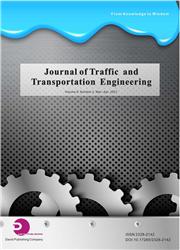Effect of Various Additives on the Low Temperature Performance of Petroleum Based Asphalt Binders
引用次数: 1
Abstract
Transverse cracking is a prevalent problem that occurs in asphalt pavement binders in cold climates and diminishes the integrity of the road as well as shortens the life span of the road leading to premature failure. Current specification for testing petroleum asphalt binders for transverse and low temperature cracking is not elaborate enough to accurately model the engineering behaviour of the binders. Besides, neat asphalt derived from petroleum crude oil does not seem to perform well at certain low temperatures without some modification to it. Thus, a study was to be undertaken to determine the low temperature behaviour of 60-70 penetration neat binder modified with traditionally used materials such as Crushed Lime Stone Powder (CLP), Hydrated Lime (HL) and Cellulose Oil Palm Fiber (COPF) at temperatures 0 °C, -5 °C and -10 °C. The study was carried using the state of the art Bending Beam Rheometer (BBR) to assess the stiffness value, m-value and deflection level. The tests were performed in accordance with AASHTO T 313-12 specification. The results of the penetration, rotational viscosity and softening point showed that all of the modified binder specimens are within the required range. However, the performance assessments on the modified petroleum binders with additive materials showed a varied nature with CL powder being the best and the COPF the lowest. It was also observed that the crushed lime stone powder had an increase in stiffness, reduction in deflection and m-value.不同添加剂对石油基沥青结合料低温性能的影响
横向开裂是寒冷气候下沥青路面粘结剂普遍存在的问题,它降低了道路的完整性,缩短了道路的使用寿命,导致过早失效。现行的石油沥青粘结剂横向和低温开裂试验规范不够详细,无法准确模拟粘结剂的工程性能。此外,从石油原油中提取的纯沥青,如果不进行改性,在某些低温下的性能似乎不太好。因此,在0°C、-5°C和-10°C的温度下,将进行一项研究,以确定用传统使用的材料(如碎石灰石粉(CLP)、水合石灰(HL)和纤维素油棕榈纤维(COPF)改性的60-70渗透性纯粘合剂的低温行为。该研究使用最先进的弯曲梁流变仪(BBR)来评估刚度值、m值和挠度水平。试验按照AASHTO T 313-12规范进行。侵彻量、旋转粘度和软化点测试结果表明,改性后的粘结剂试样均在要求范围内。但添加剂改性后的石油粘结剂的性能评价各不相同,其中CL粉性能最好,COPF性能最差。石灰石粉粉碎后刚度增大,挠度减小,m值减小。
本文章由计算机程序翻译,如有差异,请以英文原文为准。
求助全文
约1分钟内获得全文
求助全文

 求助内容:
求助内容: 应助结果提醒方式:
应助结果提醒方式:


